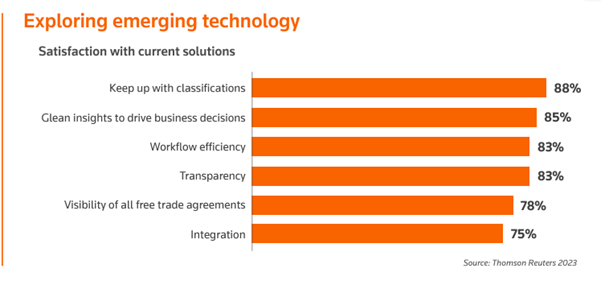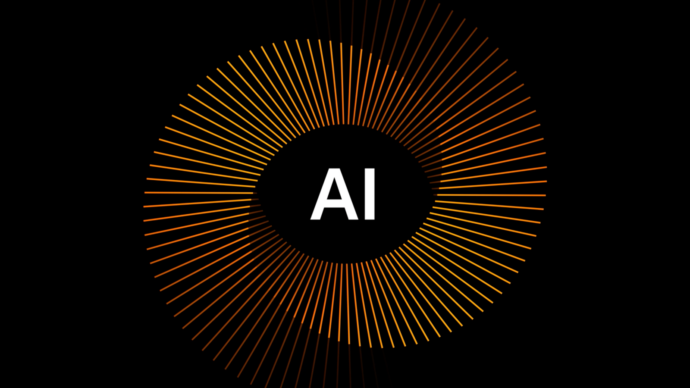Artificial Intelligence (AI) is not a new concept, but since the emergence of ChatGPT last year, the advantages versus the risks it could present as it becomes smarter and more prevalent have been widely debated everywhere. When it comes to global trade, there are powerful arguments as to why AI should be embraced, and understandable concerns around the ethics, accuracy, and security of data. At a recent Thomson Reuters event, Liz Connell, Senior Director of Product Management at ONESOURCE Global Trade, discussed why AI is relevant to global trade and how it can be applied effectively.
AI is here to stay: it’s not something that businesses can simply ignore. So it’s important to understand what it is, and how it can help companies that engage in global trade. For Connell, one of the most important takeaways is that AI should be seen as an enabler, not a threat to jobs, pointing out that AI technology can help global trade professionals keep on top of the multitude of expectations on them.
Staying on top of demanding requirements
“Global trade managers must have the technical know-how of an engineer, the legal sense of an attorney, the scrupulousness of an accountant, the organizational skills of a project manager, the business acumen of an executive, the cultural awareness of a diplomat, and the communication skills of a leader. That is asking so much. There is a lot…to balance every day,” she said. “AI is not replacing you: this is a tool to help you…do your jobs better.”
As professionals’ roles become more demanding, so the business of global trade is getting more complex by the day, and sophisticated tech tools are increasingly necessary to keep on top of the fast-evolving regulatory and compliance requirements. A raft of new sanctions, export controls and regulatory updates were introduced last year, including more than 740,000 updates in the first eight months of 2023 alone.
Staying up to date with these changes can seem like a near-impossible task. Then there are the reporting and filing requirements. A huge amount of data is being generated in the process which must not only be reported to government agencies around the world but shared with supply chain partners too.
AI’s role in international trade
Against this backdrop, finding ways to make processes more efficient and being able to surface actionable insights easily can play a big part in improving international compliance programs. AI is the answer:
- AI can automate repetitive processes, such as in product classification. It can learn how to classify products, and then provide recommendations or predictions that you can either select or ignore, based on your knowledge and experience. This can help save time and improve accuracy.
- Another way AI in global trade can be extremely useful is in proactively detecting abnormalities in your data processing, such as by flagging up problems in the data flow, pointing out what data you might be missing, or highlighting where areas of risk in your business operations.
- There are helpful ‘conversational’ experiences you can have with AI, such as asking a chatbot for answers on what regulations you need to know about when shipping to a new location.
As is to be expected, companies are at different stages of the AI adoption journey. According to research by ONESOURCE, some are still managing everything through spreadsheets and disparate systems, while others are now deploying a global trade platform, and almost a quarter (23%) are exploring emerging technologies to help them – a finding which tallies with the Thomson Reuters 2023 Corporate Global Trade Survey Report.
AI in trade is delivering business benefits
As those companies with the most advanced tech tools in place testify (Source: Thomson Reuters Global Trade Survey 2023), they are largely pleased with how sophisticated solutions are enabling them to keep on top of trade classifications, make better decisions, become more efficient, and have greater clarity over trade rules and requirements. All of which have a bearing on compliance as well as competitiveness. As those tools become even more intelligent, there will be even greater compliance and business benefits to be gained.

It’s becoming clear that using clever tools can make a big difference to the task of managing the fast-paced and disruptive nature of global trade, putting power in the hands of global trade professionals.
As Connell said, “Technology is nothing without the right people. We need you, the trade professionals, to learn and to lean in, to be aspirational in your technology goals. You need to understand the technology you’re using, how it’s adapting and leveraging AI to make your business better.”
_____________________________________________________________________________________________ Find out more about how AI can help you enhance your compliance program and keep up with the competition _____________________________________________________________________________________________
_____________________________________________________________________________________________